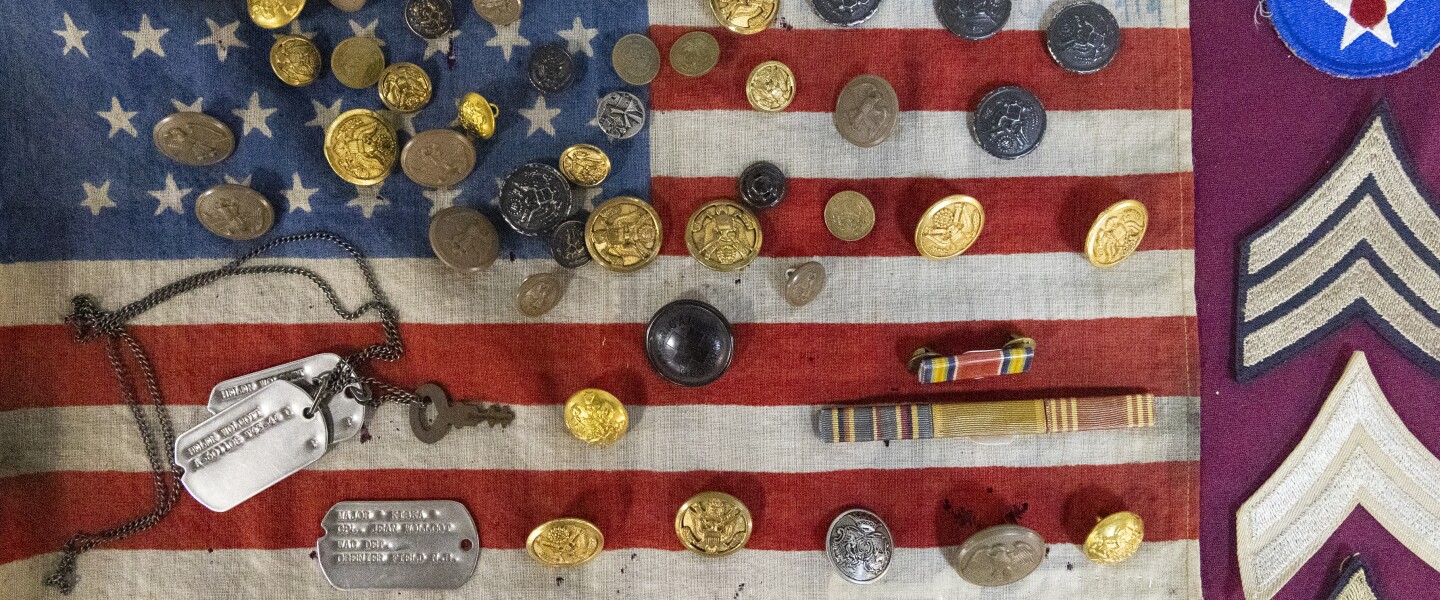
(Photos by David Kidd/Governing)
Honorably discharged, Williams returned home to Pennsylvania in 1947. Like many soldiers of his generation, he rarely spoke of his wartime experiences. “It wasn’t talked about,” his daughter says now. ”He kept things to himself.” The only mementos Williams saved from his service were his dog tags, an insignia hat pin and a few photographs, all of which he placed in a bank safe deposit box. There they remained, unbeknown to anyone.
Williams died in 1985, the contents of his safe deposit box eventually ending up in the possession of the state, part of $4 billion worth of unclaimed property currently held by the Pennsylvania Treasury. “That’s not our money,” says Treasurer Stacy Garrity. “It belongs to Pennsylvanians. We really want to get it back to them.”
Unclaimed But Not Unwanted
Every year hundreds of millions of dollars in unclaimed property winds up at the state Treasury. Cash, coins, antiques, bonds, jewelry, gold and silver are among the items turned over to Treasury every year. “We don’t take the big stuff,” says Garrity. Cars, boats and anything with a title goes to the Department of Transportation.

It is estimated that one in 10 Pennsylvanians has unclaimed property waiting for them. A streamlined online claims system has resulted in an increase to more than 8,000 claims processed per month, with the average value at about $2,000. “It really removed a lot of red tape,” says Garrity. “A lot of times, depending on the value of the claim, you can get approved instantly online.”
While the forgotten items wait for their rightful owners to reclaim them, they remain safely ensconced underground at the State Capitol Complex in Harrisburg.
A Secure Location
Completed in 1939, the state Finance Building was built over a massive vault, intended to safeguard piles of cash. It is the largest working vault in the United States, with 400 tons of steel used in its construction. The front door alone weighs 60 tons. “This vault is way more cool than the vault in 'Ocean’s Eleven,'” says Treasurer Garrity. “The only thing that 'Ocean’s Eleven' has versus us is George Clooney.”

On this day in late October, employees are examining and cataloging items in two of the cages. Three other rooms remain dark. Piles of cardboard boxes can be seen through their barred doors. The last cage on the right, open and brightly lit, is set up to display part of the treasury’s collection of unclaimed items.
A silver service is spread across a folding table against one bank of drawers, each item wrapped in clear plastic with its own bar code. More silver goblets and trays are on display in an open old trunk in the corner. Jewelry, watches, gold coins and two antique guns fill three mismatched display cases. A collection of guitars and drums flank the barred doors.

Special Treatment for Military Medals
Unlike everything else that comes to the treasury, military decorations and mementos are kept in perpetuity and never auctioned. They hold a special significance to Treasurer Garrity, a 30-year veteran of the Army Reserves. “Returning those military decorations is very near and dear to my heart,” she says. “To me, those are the items that are priceless.”

Susan Amspacher is thankful for the effort that was taken to find her and for the return of her father’s few belongings. “It’s not much,” she says. “It was his dog tags and a pin and a badge. But it meant a lot to me. I was amazed how they tracked me down. I was just ecstatic!”
How to Keep What’s Yours
Treasurer Garrity is on a mission to return the unclaimed property held within the department’s underground vault. But she would prefer Pennsylvanians take precautions to avoid losing their possessions in the first place. “If people want to make sure their property doesn’t end up with me, what they should do is communicate with their financial institution at least once every three years,” she says. “Make sure that somebody you trust knows where you keep your financial records. A lot of unclaimed property is uncashed checks. Make sure you deposit or cash your checks as soon as you get them.”

Related Articles












